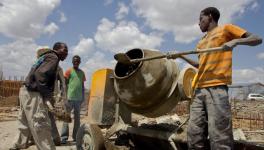The Long and Winding Road to a Binding Corporate Treaty

Dorothy Guerrero is with social movements from around the world in Geneva this week to push the United Nations to adopt a binding treaty on corporations and human rights.
The struggle to make transnational corporations (or TNCs) accountable for the ill-effects of their operations and abuses, especially in the global South, has been a long and hard one. It can be traced all the way back to 1972 when Chilean president Salvador Allende urged for the creation of a Code of Conduct for TNCs in a speech at the United Nations. Since then, there have been numerous international initiatives to enshrine the primacy of human rights over the power of corporations to operate with impunity. But each has been met with strong countermeasures by states that have been promoting and protecting the hegemonic consolidation of corporate power since the 1980s.
How TNCs Built and Consolidated their Power and Previous Attempts to Create Legal Frameworks on TNCs
There have long been systematic manoeuvres from rich countries to block attempts to regulate and control TNCs, as well as substitute existing laws and regulations with a framework of advancing and protecting investors’ rights. This framework was first developed, entrenched and has expanded in the World Trade Organisation. It was carried forward by various bilateral and multilateral free trade agreements, and especially through bilateral investment promotion and protection treaties that rich states like the US, the UK, and other European countries promoted in those processes.
At the same time, there has been a proliferation of policies starting with the Structural Adjustment Programs in the 1990s, promoted by the World Bank and other international financial institutions or IFIs. The combinations of economic, political and legal infrastructures created by IFIs and the global trade and investment regimes produced the current world order wherein corporations control trade globally. It is very difficult for states to limit corporate power because TNCs have shaped the very laws of our current global order.
This infrastructure of power and influence is strongly in place all the way up to the United Nations, where TNCs managed to put themselves as actors with the same status as nation-states. They were able to do this through the Global Compact that was proposed in 1998 and launched in 2000. That process normalized and legalised the practice of lobbying by big TNCs at the UN and other multilateral institutions.
The key previous attempts to create a binding international legal framework specifically for transnational corporations have not been successful. At the moment, the only existing norms are the International Labour Organisation’s (ILO) Tripartite Declaration of Principles concerning Multinational Enterprises and Social Policies and a few other non-binding instruments (eg. OECD guidelines). In these mechanisms, workers can make states accountable for the violations of corporations, but not the corporations themselves.
There are codes of conduct in the regulation of TNCs that are entirely voluntary through the corporate social responsibility (CSR) framework, which is grossly failing in regulating TNCs and instead allows the destructive and abusive activities of TNCs to continue. In practice, CSR is a successful global marketing strategy. Putting in place a universal and binding treaty on TNCs, therefore, is a corrective and appropriate measure to address four decades of far-reaching political and legal offensives by transnational capital, as well as to bring about fundamental shifts in power relations between corporations, states and people.
The UN Process for a Binding Treaty on TNCs and Other Business
The resolution that started the process of creating a binding UN Treaty on TNCs was co-sponsored by the governments of Ecuador and South Africa in June 2014. The meeting being held in Geneva this week is not yet the negotiation. It is the 3rd Session of the Open-ended Inter-Governmental Working Group (IGWG) on Transnational Corporations and Other Business Enterprises to discuss the draft elements prepared by the government of Ecuador.
According to Ambassador Guillaume Long, current Chair or Rapporteur of the process, in a meeting with civil society organisations, the current document went through a very inclusive participatory process. There were 200 activities in the three-year process of writing and most of the contributions found their way into the resolution. The contributions came from academics and legal experts on international law, trade campaigners, environmentalists, trade unions, peasant groups, indigenous peoples and more.
There is a general recognition from movements and NGOs that the elements of the draft resolution provide a good start in this year’s process, which is crucial in the advancement of the treaty overall. The main elements of the draft resolution discuss the primacy of human rights over rights of corporations that emanated from trade and investment treaties. The focus is on victims of TNC violations and to reduce impunity. It recognises the primary responsibility of states to protect and take care of their people vis-à-vis abuses of TNCs. At the heart of the resolution is an attempt to highlight the responsibility of corporations and the scope of the treaty.
The Politics of Key States in the Process
The meeting is an opportunity for states to present their positions on the various elements. The EU block, as expected, has continued to undermine and obstruct the process. Together with Russia, it reiterated its reservations about the process. It can be remembered that the EU voted against the treaty in 2014. This year, there are more EU member-states attending the meeting. The EU governments are not presenting individual country positions, but are presenting their positions on the various elements of the document as a block. Many European countries are advancing and seeking to secure bilateral trade treaties with developing countries.
EU member countries the Netherlands, Belgium, Sweden, the UK and Australia reiterated their support for the EU position that there are enough national and international mechanisms for redress of human rights. These countries, together with Mexico, Brazil, and France, emphasised the need for consensus building. Ecuador, South Africa, the Philippines, Namibia, Kenya, Venezuela and Bolivia are in favour of continuity of the process.
A member of the European Parliament from the United Left, Lola Sanchez, expressed a strong criticism of the obstructionist stance of the EU delegation on the first day of the meeting on Monday. She reminded the EU delegation that the European Parliament had already called for the EU delegation to engage constructively in the treaty negotiations.
Meanwhile, there have been substantial changes in the politics of governments in Latin America and many have gone conservative. However, more consultations have happened there than any region in the world. Ecuador’s leadership is very meaningful. Brazil agrees that there is a need for the treaty to address the activities of TNCs, but wants it to also including domestic enterprises. South Africa and Indonesia have kept the strong position that the focus should just be on business enterprises with a transnational character.
The Very Visible and Substantial Role of NGOs and Movements in the Process
The current process is benefitting from increased NGO interest and support. There are now coalitions of NGOs in a few countries (Germany, the Netherlands, France, Spain, Italy) that are following the process. There are two connected initiatives: the Treaty Alliance and the Global Campaign to Reclaim People’s Sovereignty, Dismantle Corporate Power and Stop Impunity. The Global Campaign is also presenting an alternative treaty and supported the formation of the Parliamentarians’ Forum for a Binding Treaty on TNCs.
It’s a long process – our strategy meetings start at 8am and we only get to dinner at 9pm. But day by day, we are having an effect.
Disclaimer: The views expressed here are the author's personal views, and do not necessarily represent the views of Newsclick.
Get the latest reports & analysis with people's perspective on Protests, movements & deep analytical videos, discussions of the current affairs in your Telegram app. Subscribe to NewsClick's Telegram channel & get Real-Time updates on stories, as they get published on our website.
























